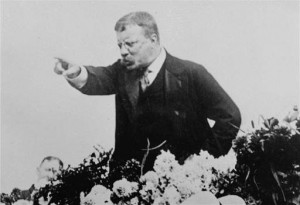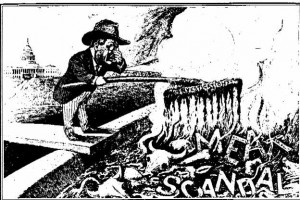When people think of the term, “muckraker,” what comes to mind are some of the people that changed the history of the world forever. Some of those people include Nellie Bly, Bob Woodward and Carl Bernstein, Upton Sinclair, and plenty of others. According to the dictionary, a muckraker is someone who seeks to expose corruption of businesses or government to the public. However, there was one man who truly coined the term of “muckraker,” and he spoke softly, and carried a big stick. That man was Teddy Roosevelt.

TR campaigning and doing his thing in 1900
From the 1700s-1800s there would be a huge increase in what would be known as, “muckraking.” There was a lot of reporting during this century that had to do with the corruption of businesses and government. By the 1900s, magazines such as Cosmopolitan, The Independent, and McClure’s were already in wide circulation and read frequently by the growing middle class.
The term “muckraker” was first used by Teddy Roosevelt in a speech in 1906 when he was President of the United States. His quote was both memorable and was about William Randolph Hearst and yellow journalism.
“In Bunyan’s Pilgrim’s Progress you may recall the description of the Man with the Muck-rake, the man who could look no way but downward with the muck-rake in his hands; Who was offered a celestial crown for his muck-rake, but who would neither look up nor regard the crown he was offered, but continued to rake to himself the filth of the floor.”
Roosevelt had his agreements and disagreements in muckraking. First off, he was happy with these reporters “scraping the muck” of America and really showing what goes on behind the scenes of corporate America. However, he also thought “the man who did nothing else was certain to become a force of evil.”
While Roosevelt was president, he had his restrictions on those attempting to “muckrake.” For instance, in Upton Sinclair’s The Jungle, Sinclair wrote about the dangers of the meat-packing industry, poverty, absence of social programs, unpleasant living and working conditions, and unhappiness among the working class. Roosevelt began to get the wrong idea about Sinclair.

Political cartoon showing TR and his opinion of the meat-packing industry
TR was suspicious of Sinclair being a socialist after reading the conclusion to The Jungle. After this, he sent labor commissioner Charles P. Neill and social worker James Bronson Reynolds to Chicago to make surprise visits to meat packing facilities and see what goes on in these factories. These two men were highly trusted among Roosevelt, who did not trust too many people. After seeing the factories, Neill and Reynolds still found the conditions at the factories less than appealing and and saw there was lack of concern among the managers who worked there.
Theodore Roosevelt did it all when he was President, as the whole “muckraking” movement would not be possible without him. TR was very smart about how he went about the whole movement. He liked what was going on, but really carefully monitored what went on. He believed in getting all of the right answers and did not want the American public to get lied to, as was going on. Roosevelt did things his way, which turned out to be quite successful and went a long way.

Leave a response